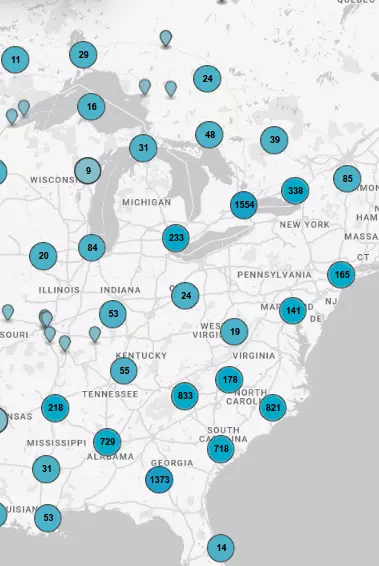Lummus Cotton Gins
On this site in 1847 stood the E.T. Taylor Cotton Gin Manufacturing Company. In 1854 it became the W.G. Clemons, Brown & Company and operated as such until the Civil War. In 1867 Franklin H....
- lat34
Linwood Cemetery (Side 2)
(Continued from other side) Helen Augusta Howard (1865-1934), founder of the Georgia Woman Suffrage Association; Ulysses Lewis (1799-1856), city´s first intendant and kinsman of George...
- lat34
Linwood Cemetery (Side 1)
A part of the 1828 plan of Columbus, Linwood contains graves of pioneer citizens and their descendents, as well as the tombs of some 200 Confederate soldiers. Among those buried here are Anna...
- lat34
Liberty Hill Baptist Church
Organized in 1869 by slaves, the first church building was built on land donated by Mrs. Emma Jones and Mrs. Nora Felton. The church was called the Bush Arbor Church because the construction...
- lat34
Leonard Spring Columbus' Original Source of Water
In 1839 citizens first called for the development of a water works system. On this site is located the original source of water for drinking and general household use for Columbus. Beginning...
- lat34
John McIlhenny Home
John McIlhenny, Civil Engineer, City Council member, and Mayor of Columbus 1873-1874, lived in this house in the 1860´s. Mr. McIlhenny is recognized as the father of the Columbus public school...
- lat34
700 Broadway
Situated on a lot that was part of Edward Lloyd Thomas´ original 1828 plan for the city, this c. 1970 Victorian townhouse is the only one of its design in Columbus. Among the families...
- lat34
High Uptown Historic District (Side 1)
This area known as "High Uptown" contains historic residential structures that were built by affluent business and community leaders of the 19th and early 20th centuries. These homes are...
- lat34
George Parker Swift I
George Parker Swift, I, pioneer cotton manufacturer of Georgia, was born Sept. 1, 1815, in Fairhaven, Massachusetts. He moved to Georgia in the early 1840´s and started the Tribune Mills at...
- lat34
Garrett-Bullock- Delay House (Side 2)
A fine example of Queen Anne style architecture, this High Victorian mansion was built in 1881 by Col. Joseph S. Garrett (C.S.A.)., Columbus merchant, postmaster, and planter. The house was sold...
- lat34
Garrett and Sons (Side 2)
Joseph Simpson Garrett, a whiskey, tobacco, and groceries merchant, constructed this building in 1883 for his business, Garrett and Sons. This wholesale business was regarded as the first of its...
- lat34
Friendship Baptist Church
Founded in 1892 at 4th Avenue and 6th Street, the church moved to its permanent home here in January of 1897. The first minister was Rev. J. S. Kelsey, who served the church from 1897-1901. The...
- lat34
Fourth Street Baptist Church
In 1900 the Mt. Canaan Baptist Church was established under the leadership of the Reverends John Bellamy and Willis Carter when a few men and women met under a fig tree on Third Avenue to worship....
- lat34
First Presbyterian Church (Side 2)
The First Presbyterian Church building on the northeast corner of Eleventh St. and First Ave. was dedicated in 1862. In 1891 the sanctuary was severely damaged by fire. It reopened for services in...
- lat34
First Presbyterian Church (Side 1)
The Presbyterians were granted one of the original church lots in the 1828 Columbus plan. It was on the north side of Chapel St. between Second and Third Avenues. The fourteen charter...
- lat34
First Black Public School
Near here, in July 1872, the first local public school for black students was opened. The school was the result of an action by the City Council directing the Trustees of the Columbus...
- lat34
First Baptist Church
On February 14, 1829, twelve persons met and organized under the name Ephesus Baptist Church of Columbus. The northern half of this block had been designated for religious purposes in the...
- lat34
1918 Diamond Jubilee 1993 Camp Benning/Fort Benning (Side 2)
Fort Benning´s mission has always been to train infantrymen for their task of defending the nation. Fort Benning now located south of Columbus on some 200,000 acres is the free world´s...
- lat34
First African Baptist Church
The initial congregation of this church was formed by slaves who had attended Ephesus Baptist Church (later First Baptist), since its organization on February 14, 1829. When a new church was built...
- lat34
Empire Mills
G.W. Woodruff began grist operations in 1861 on this site previously occupied in 1847 by E.T. Taylor Cotton Gin Company and in 1841 by William Waters Gerrard´s cotton warehouse. Empire Mills ran...
- lat34
